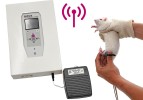Authors
C. Le Roy, E. Laboureyras, S. Gavello-Baudy, J. Chateauraynaud, J.-P. Laulin et al.
Lab
Université Bordeaux, INCIA, CNRS UMR 5287, Bordeaux, France.
Journal
The Journal of Pain
Abstract
Although stress induces analgesia, there is evidence that stressful events may exacerbate pain syndromes. Here, we studied the effects of 1 to 3 prestressful events (days 0, 2, and 7), such as non-nociceptive environmental stress, on inflammatory hyperalgesia induced by a carrageenan injection (day 14) in 1 rat hind paw. Changes in nociceptive threshold were evaluated by the paw pressure vocalization test. The higher the number of stress sessions presented to the rats, the greater was the inflammatory hyperalgesia. Blockade of opioid receptors by naltrexone before each stress inhibited stress-induced analgesia and suppressed the exaggerated inflammatory hyperalgesia. Stressed versus nonstressed animals could be discriminated by their response to a fentanyl ultra-low dose (fULD), that produced hyperalgesia or analgesia, respectively. This pharmacological test permitted the prediction of the pain vulnerability level of prestressed rats because fULD analgesic or hyperalgesic indices were positively correlated with inflammatory hyperalgesic indices (r(2) = .84). In prestressed rats, fULD-induced hyperalgesia and the exaggerated inflammatory hyperalgesia were prevented NMDA receptor antagonists. This study provides some preclinical evidence that pain intensity is not only the result of nociceptive input level but is also dependent on the individual history, especially prior life stress events associated with endogenous opioid release. PERSPECTIVE: Based on these preclinical data, it would be of clinical interest to evaluate whether prior stressful events may also affect further pain sensation in humans. Moreover, this preclinical model could be a good tool for evaluating new therapeutic strategies for relieving pain hypersensitivity.
BIOSEB Instruments Used:
SMALGO: SMall animal ALGOmeter (BIO-SMALGO),Rodent pincher - analgesia meter (BIO-RP-M)

 Douleur - Allodynie/Hyperalgésie Thermique
Douleur - Allodynie/Hyperalgésie Thermique Douleur - Spontanée - Déficit de Posture
Douleur - Spontanée - Déficit de Posture Douleur - Allodynie/Hyperalgésie Mécanique
Douleur - Allodynie/Hyperalgésie Mécanique Apprentissage/Mémoire - Attention - Addiction
Apprentissage/Mémoire - Attention - Addiction Physiologie & Recherche Respiratoire
Physiologie & Recherche Respiratoire
 Douleur
Douleur Système Nerveux Central (SNC)
Système Nerveux Central (SNC)  Neurodégénérescence
Neurodégénérescence Système sensoriel
Système sensoriel Système moteur
Système moteur Troubles de l'humeur
Troubles de l'humeur Autres pathologies
Autres pathologies Système musculaire
Système musculaire Articulations
Articulations Métabolisme
Métabolisme Thématiques transversales
Thématiques transversales Bonne année 2025
Bonne année 2025 
